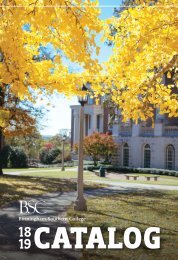2023-2024 BSC Catalog Updated_UG ONLY_FINAL[82]
You also want an ePaper? Increase the reach of your titles
YUMPU automatically turns print PDFs into web optimized ePapers that Google loves.
ACADEMIC PROGRAMS<br />
159<br />
Fellows; prepping for weekly laboratory exercises and/or examinations; grading quizzes<br />
and laboratory assignments; assisting students outside of regular lab time; and providing<br />
feedback to professors on related to laboratory exercises, assignments, and/or<br />
examinations. Further guidelines concerning teaching experiences appear in the<br />
“Teaching Experiences” section of this catalog.<br />
BI 303 Physiology (1)<br />
A study of the functions of organ systems and their role in regulation of body processes.<br />
Three lectures, one three-hour laboratory, and one TBA laboratory per week.<br />
Prerequisites: BI 125, and CH 111 or CH 149. Spring.<br />
BI 304 Microbiology (1)<br />
An introduction to basic and applied microbiology. Fundamentals of bacteriology,<br />
virology, and immunology are covered. Laboratory work includes basic, clinical, and<br />
diagnostic microbiology. Two lectures, one three-hour laboratory, and one TBA<br />
laboratory per week. Prerequisites: BI 125 and at least junior standing. Spring.<br />
BI 308 Biochemistry (1)<br />
An introduction to the structure, chemistry, and metabolism of carbohydrates, proteins,<br />
nucleic acids, and lipids. Areas of emphasis include enzyme catalysis, kinetics and<br />
inhibition, protein structure and function, and detailed analysis of metabolic pathways.<br />
Three lectures per week. (Also listed as CH 308, this course may be counted for credit in<br />
either biology or chemistry.) Prerequisites: BI 125 and CH 211, or CH 212; and at least<br />
junior standing. Fall, Spring.<br />
BI 314 Conservation Biology (1)<br />
A study of population and ecosystem level processes required to understand and conserve<br />
biodiversity. Emphasis is placed upon the genetics and demographics of populations, the<br />
implications of species interactions and community influences on conservation, and<br />
management and sustainable development case studies. Prerequisite: BI 225. Fall of<br />
even-numbered years.<br />
BI 315 Animal Behavior (1)<br />
An examination of the immediate causes and evolutionary explanations for the behavior<br />
of animals. Emphasis is placed on exposure to historical perspectives and current ideas<br />
about animal behavior, training in the methodology of behavioral experimentation, and<br />
development of independent, critical thought. Topics include sexual selection, bird song<br />
learning, and aggressive behavior. (Also listed as PY 315.) Prerequisites: BI 225 and PY<br />
101. Spring of odd-numbered years.<br />
BI 332 Vertebrate Field Zoology (1)<br />
A field-oriented study of the native vertebrate animals of the southeastern United States<br />
with special emphasis on identification, classification, and ecology. Two lectures and one<br />
three-hour laboratory per week. One weekend field trip is required. Prerequisite: BI 225.<br />
Spring of odd-numbered years.<br />
Birmingham-Southern College <strong>Catalog</strong> <strong>2023</strong>-<strong>2024</strong>


![2023-2024 BSC Catalog Updated_UG ONLY_FINAL[82]](https://img.yumpu.com/68368591/159/500x640/2023-2024-bsc-catalog-updated-ug-only-final82.jpg)

![2023-2024 BSC Catalog Updated_UG ONLY_FINAL[82]](https://documents.yumpu.com/000/068/368/576/117622bc72155e3c3a86902fd9789544961fab9f/734e4341576f6e62684b6734372b776e7666623165513d3d/32586978355852796d43786d567256654839567a64773d3d.jpg?AWSAccessKeyId=AKIAICNEWSPSEKTJ5M3Q&Expires=1717308000&Signature=kkSyjfx7ACQy7ABgOWIAzDVWd8A%3D)